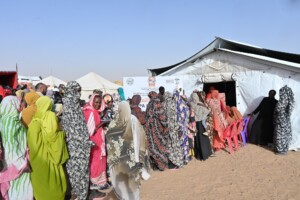IRIN: ‘Sudan may have used chemical weapons in South Kordofan as well’
Aid workers and local officials in South Kordofan have reported suspected chemical weapons use by the government. If accurate, the reports suggest a more wide-ranging campaign by Khartoum against its restive regions, IRIN states.
Aid workers and local officials in the Nuba Mountains in South Kordofan have reported suspected chemical weapons use by the Sudanese government.
If accurate, the reports suggest a more deliberate and wide-ranging campaign by Khartoum against its restive regions, the Integrated Regional Information Networks (IRIN) says in a report published last week.
Amnesty International recently announced that at least 30 likely chemical attacks have taken place in Darfur’s Jebel Marra since the beginning of this year. Khartoum denied the claims.
IRIN now reports that medical officials in war-torn South Kordofan have seen symptoms consistent with chemical weapons exposure, stretching back over at least four years of armed conflict.
Tom Catena, the only surgeon at the Mother of Mercy Hospital in Gidel, said the first incident he observed of a possible chemical attack was in April 2012, during fighting in Talodi.
18 victims of a government air raid were taken to the hospital, where they reported seeing grey smoke from the bombing that turned white.
“The people who were exposed to the smoke said they became paralysed, had blurred vision, vomiting, and some with diarrhoea,” the surgeon said. “Several said they couldn’t move their bodies for several hours, but eventually regained full function.”
The symptoms could be the result of exposure to insecticides and herbicides, or nerve agents, he added.
The second incident took place between late March and early April this year in the embattled town of El Azrag, where Catena said similar symptoms were identified.
The Nuba Relief, Rehabilitation and Development Organization (NRRDO) has also come across cases of suspected chemical attacks on civilians in the area.
“The problem is, we do not have the technical devices required to confirm these cases,” NRRDO director Ali Abdelrahman said.
Doctors Without Borders/Médecins Sans Frontières reported the suspected use of chemical weapons in Sudan as far back as 1999.
Evidence problem
Repeated calls by IRIN to the Sudan Armed Forces for comment went unanswered.
Sudan has effectively blocked access by international organisations and the media to the conflict areas in both Darfur and South Kordofan.
Amnesty International said it was unable to collect soil and blood samples in the area of Jebel Marra, and instead had to rely on interviews, satellite imagery, and analysis of photographs of injuries. The UN-AU peacekeeping Mission in Darfur (Unamid) has also been unable to corroborate Amnesty’s findings because its movements are limited by the authorities.
The Organisation for the Prohibition of Chemical Weapons, said more evidence is needed before it can “draw any conclusions” based on the investigations by Amnesty International.











 and then
and then